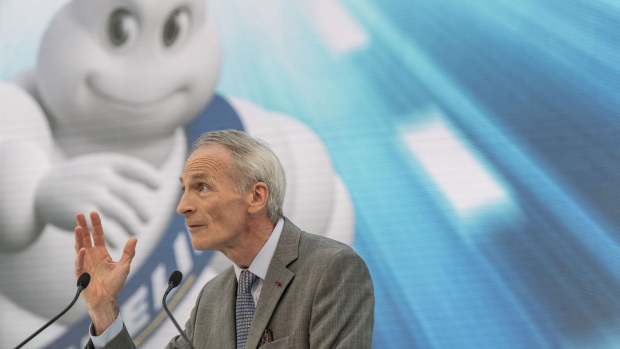Jan 21, 2019
Ghosn Denied Bail After Personal Pledges Fail to Persuade Court
, Bloomberg News

(Bloomberg) -- Carlos Ghosn’s bail application was rejected again, even after the fallen car titan offered to wear an electronic tracker and be monitored by guards to end his custody that has now lasted more than two months.
The rejection by a Tokyo court is a win for the prosecutors, who can now keep Ghosn detained as they continue to build their case ahead of an eventual trial that could be as long as six months away. In his latest bid for bail, the former Nissan Motor Co. chairman had offered to wear a tracker and be watched by private security personnel, both at his own expense.
Ghosn has been in custody since Nov. 19, accused of financial crimes that could put him behind bars for decades. The auto titan has been indicted for understating his income at Nissan by tens of millions of dollars and transferring personal trading losses to the carmaker. Nissan also claims that Ghosn misused company funds, including for homes from Brazil to Lebanon, and hired his sister on an advisory contract. Ghosn has denied wrongdoing.
His downfall, as sudden as it was unexpected, has roiled the two-decade alliance between Nissan and France’s Renault SA, which he dominated as chairman of both companies and of the entity that governs their partnership. France’s finance minister and Nissan CEO Hiroto Saikawa were both quick to downplay a report in the Nikkei newspaper over the weekend that the French side was planning to put the two carmakers under one holding structure.
Electronic Tracker
Ghosn’s lawyers, represented by Motonari Otsuru, made a fresh application for bail on Friday, after a court rejected his previous request. In his bid for bail, Ghosn also offered to surrender his passports, give shares as collateral and refrain from contact with anyone who could be a witness against him.
Ghosn’s previous unsuccessful requests for release envisioned him heading to France, where he’s a citizen, before returning to Japan for trial.
Even a highly-restricted release would have allowed Ghosn to more easily prepare for trial. As is customary in Japan, while in custody he’s been extensively interrogated without his lawyers present, and has no access to documents that could help him construct a defense. He has also been barred from seeing or communicating with his family.
Since Ghosn’s initial arrest, prosecutors have repeatedly extended his detention and re-arrested him over new allegations. Gaunt, handcuffed and with a rope around his waist, he appeared before a judge in a Tokyo court Jan. 8 -- the only time he’s been seen in public since his shock arrest.
Renault Decision
The Ghosn drama has raised questions about Nissan’s corporate governance, with the allegations spanning at least a decade. Nissan, as a company, has also been indicted along with Ghosn for the pay understatement.
While Nissan fired Ghosn almost immediately, he still retains his posts at Renault and at the alliance -- though probably not for much longer. Michelin Chief Executive Officer Jean-Dominique Senard is expected to join Renault’s leadership, people familiar with the matter have told Bloomberg News.
Renault’s executive board may meet on Wednesday and name Senard non-executive chairman and head of the alliance, and at the same time appoint Thierry Bollore as Renault’s CEO, Le Figaro reported Sunday. Bollore is currently acting as CEO on an interim basis. A Renault spokesman declined to comment.
Tensions are simmering on both sides of the alliance because of its lopsided structure. While Nissan has outgrown Renault in sales and profits, the Japanese company has far less influence. It owns 15 percent of Renault, which in turn has 43 percent of Nissan. France is Renault’s most powerful shareholder, with a 15 percent stake, extra voting rights and two seats on the board. Mitsubishi Motors Corp. was added to the alliance in 2016.
Delegation Visit
A delegation including Martin Vial, a Renault director designated by the French state, visited Japanese officials including Saikawa in Tokyo last week. According to people close to the delegation, the discussions focused on possible ways and ideas to cement the Renault-Nissan alliance, with the creation of a single holding company for both carmakers being one of the options.
The people emphasized that no proposal was made at the meeting and it’s too early to discuss concrete plans, asking not to be identified because the deliberations are confidential.
While Nissan wants to maintain the partnership, it will likely resist any push toward a full combination, another person familiar with the matter said. Ghosn had been pushing for a closer integration before his arrest, including a possible merger that Bloomberg reported last year, but Nissan has balked.
To contact the reporter on this story: Ma Jie in Tokyo at jma124@bloomberg.net
To contact the editors responsible for this story: Anand Krishnamoorthy at anandk@bloomberg.net, Ville Heiskanen, Lena Lee
©2019 Bloomberg L.P.